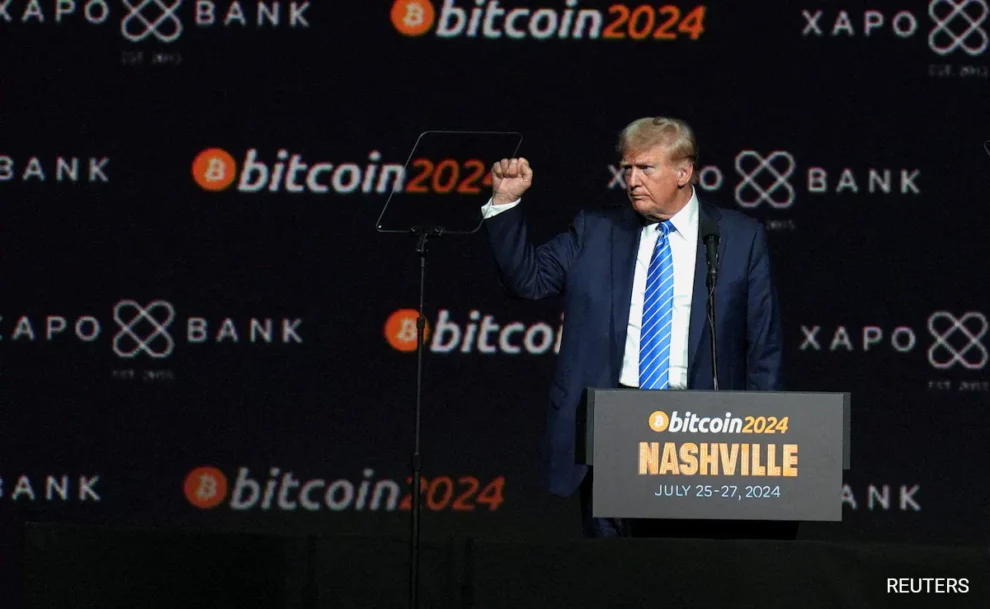Bitcoin’s value skyrocketed past $109,000 early Monday, marking an extraordinary surge ahead of Donald Trump’s inauguration as cryptocurrency markets react to the incoming president’s promised industry-friendly agenda. The dramatic price increase reflects growing confidence among crypto investors that Trump’s administration will usher in a new era of digital currency adoption and regulation.
The latest rally, which saw bitcoin jump more than $9,000 in early trading, builds on months of steady gains following Trump’s election victory. The cryptocurrency’s meteoric rise from roughly $20,000 two years ago to breaking the $100,000 barrier last month represents a remarkable transformation in both market value and mainstream acceptance.
Trump’s evolution from cryptocurrency skeptic to ardent supporter mirrors broader shifts in both political and financial circles. The president-elect, who once dismissed bitcoin as a “scam,” has become one of its most powerful advocates, launching his own cryptocurrency ventures and promising to transform the United States into the world’s “crypto capital.
The cryptocurrency industry, which felt marginalized under the Biden administration, invested heavily in Trump’s campaign. Their support appears poised to pay dividends as Trump’s cabinet nominations signal a dramatic shift in federal policy. Key positions at the Treasury Department, Commerce Department, and Securities and Exchange Commission are set to be filled by noted cryptocurrency supporters.
The industry’s newfound political clout was on full display at Friday’s inaugural “Crypto Ball,” where thousands of dollars per ticket granted access to an unprecedented celebration of what supporters are calling America’s first “crypto president.” The event symbolized the remarkable journey of digital currencies from the financial fringe to the corridors of power in Washington.
Trump’s campaign promises included several ambitious initiatives aimed at cementing America’s position in the global cryptocurrency market. Among these are plans to establish a national cryptocurrency stockpile, implement industry-friendly regulations, and appoint a dedicated cryptocurrency “czar” to coordinate federal policy. Speaking at a bitcoin conference last summer, Trump assured supporters: “You’re going to be very happy with me.”
The dramatic price movements in cryptocurrency markets highlight both the potential and volatility of digital currencies. Created in 2009 as a decentralized alternative to traditional banking systems, bitcoin has faced persistent skepticism from critics who question its practical utility and point to its popularity among criminal enterprises, fraudsters, and sanctioned nations.
Despite these concerns, cryptocurrency has demonstrated remarkable resilience through multiple market cycles. Bitcoin’s latest surge comes after a brief dip to $90,000, demonstrating the market’s continued volatility even as overall valuations reach unprecedented heights.
Trump’s promised first 100-day agenda includes establishing an advisory council to develop “clear” and “straightforward” cryptocurrency regulations, a move that industry observers believe could provide much-needed regulatory certainty. This approach marks a significant departure from previous administrations’ more cautious stance toward digital currencies.
The cryptocurrency market’s response to Trump’s incoming administration reflects broader changes in how digital assets are perceived by mainstream financial institutions and government regulators. What began as an experimental form of electronic cash has evolved into a trillion-dollar market that commands attention from the highest levels of government.
As Trump prepares to take office, the cryptocurrency industry stands at a pivotal moment. The combination of record-high valuations and promised government support suggests a new chapter in the development of digital currencies. However, questions remain about how campaign promises will translate into policy and whether the current market enthusiasm can be sustained under the practical constraints of governance.
















Add Comment